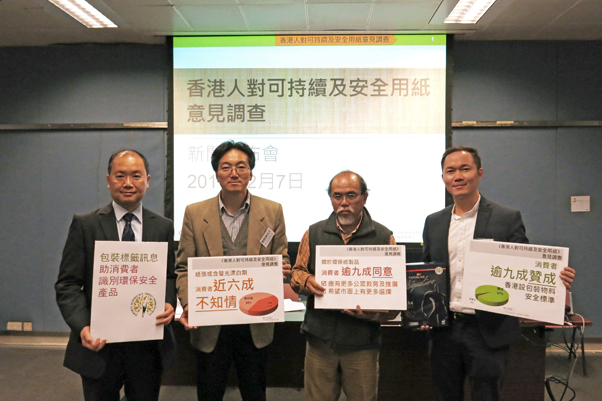Hong Kong Consumers Willing to Pay Premium for Sustainable Paper Products
![]() Print this Article | Send to Colleague
Print this Article | Send to Colleague
Gold East Trading (Hong Kong) Co., Hong Kong, China, a subsidiary of Asia Pulp & Paper (APP), Indonesia, this week announced results of the "Sustainable and Safe Paper Usage in Hong Kong" survey, which revealed that nearly 70% of Hong Kong consumers are willing to pay an additional 5% or more to purchase paper products from sustainable sources. Additionally, more than 70% of respondents prefer to visit restaurants that use safe food packaging.
The survey of 1,037 people completed in the third quarter of 2016 by the Hong Kong Polytechnic University's Centre for Social Policy Studies concludes that sustainability and safety are as important for Hong Kong consumers when they purchase paper products or consume food packaging. APP believes that this creates an opportunity for suppliers to differentiate their brands and products if they introduce safer and more environmentally friendly products.
When purchasing paper products, 67% of consumers consider whether the products are sustainable and have environmental certifications. However, around 90% of respondents have not heard of the main forest certification systems including FSC (Forest Stewardship Council) and PEFC (Programme for the Endorsement of Forest Certification). These two organizations together account for some 98% of the world's certified forests and chain of custody certificates. In fact, Hong Kong consumers realized they need to acquire knowledge about sustainable paper products, and 93% of respondents agreed that more education on how to distinguish sustainable paper products is needed.
"It's good news for the environment and for paper product producers that Hong Kong consumers prefer to purchase products with sustainable and environmental friendly packaging. And that they are willing to pay a premium for sustainable packaging," said Thomas Yu, head of Gold East Trading (Hong Kong) Co. "If paper product producers and suppliers are able to capture the opportunity and improve their product packaging, not only can they play a part in saving the environment, but also improve the corporate image and increase the trust of consumers in the brands.
"Take APP as an example. We announced in 2013 the Forest Conservation Policy with an aim to offer environmentally-friendly paper products and safe food packaging of high standard, as part of our commitment to sustainable forest management," Yu said.

In photo are (l-r) Thomas Yu, Gold East Trading (Hong Kong) Co. (on behalf of Asia Pulp & Paper); Dr. Chung Kim Wah, Hong Kong Polytechnic University Department of Applied Social Sciences Centre for Social Policy Studies; Ricky Fan, Hong Kong Environmental Protection Association; Tom Hun, Intertek Testing Services Hong Kong Ltd.
The survey also investigated the use of safe paper products in restaurants and revealed that more than 90% of consumers said that the government should establish regulations to ensure the safety of food packaging and more public education is needed in this area.
Specifically, 59% of consumers do not know that some paper products contain harmful optical brightening agents (OBAs), which are used to brighten papers. Among the 57% of consumers who do not pay attention to the safety of food packaging when they buy foods from restaurants, 79% pointed out that most restaurants do not provide relevant safety information even if they would like to know more.
Yu added that "as the survey highlights, consumers expect the industry and government to safeguard public health by ensuring the safety of food packaging. However, we believe there is room for improvement in the areas of regulation and industry practice, so we hope to work with the industry and government on setting a safety standard that is consistent in preventing the use of harmful substances such as OBAs in food-packaging materials, for the sake of public health. It would be a good start for the industry to take the lead in keeping the consumers well informed and helping them to make wise decisions."
Tom Hun, GM of Chemistry Lab, Intertek Testing Services Hong Kong Ltd., explained that "food packaging materials like paper, plastic, and ceramics may contain harmful materials such as fluorescent brightener, heavy metal, and plasticizers. A number of countries in Asia, America, and Europe have established specific safety standards to regulate food packaging.
"Consumers should choose food packaging and containers that can meet safety standards. They should also process pre-packaged foods according to instructions, and stop using damaged food packaging and containers," added Hun.
Ricky Fan, chairman of the Hong Kong Environmental Protection Association, said that "the survey conducted by The Hong Kong Polytechnic University revealed that Hong Kong people expect to receive more information and education on sustainable and safe packaging. The government should tighten the regulations and provide more guidance in this area. For example, the packaging provided by suppliers and restaurants should meet certain food safety and sustainability standards, and the certification should be printed on packages so that consumers can distinguish those products. The government should also provide education to the public regarding the standards and regulations."


